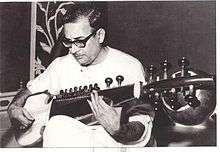Radhika Mohan Maitra
| Radhika Mohan Maitra | |
|---|---|
 Radhika with mohan veena | |
| Background information | |
| Born | 1917 |
| Origin | Calcutta, Bengal Presidency, British India |
| Died | 1981 |
| Genres | Hindustani classical music |
| Occupation(s) | Composer, Sarod player |
| Instruments | Sarod |
| Associated acts | Buddhadev Das Gupta, Sanjoy Bandopadhyay |
Radhika Mohan Maitra (1917–1981) was an Indian sarod player and the guru of Buddhadev Das Gupta and Sanjoy Bandopadhyay[1] Maitra was considered an influential figure in 20th century sarod playing and received the title Sangeetacharya.[2] He was among those awarded the Sangeet Natak Akademi Award in 1971.[3]
Radhika Mohan Maitra came from a Bengali zamindar family that had a history of musicianship and of patronising that art. His grandfather, Lalit Mohan Maitra, was a player of the tabla, his father, Brajendra Mohan, played the sarod, and his mother learned the sitar. Among those who were patronised by his grandfather was Mohammed Amir Khan and it was he who acted as the guru and principal teacher of Radhika, although the pupil also learned other instruments and styles of music with his permission. In addition to his musical training, Maitra held an M.A. degree in philosophy, awarded by the University of Calcutta, and also a LL.B. law degree. He taught philosophy for a while and was also a noted musicologist with several books to his name.[4]
Maitra rose to prominence as a musician in the 1950s, when he was in demand for concerts both within India and elsewhere in the world. Aside from radio recitals, he performed in countries such as Afghanistan, Australia, China, New Zealand and the Philippines as part of cultural delegations organised by the Government of India, and he also performed in a non-government tour of the USA in 1975. It was from around that time that he gradually reduced his appearances, preferring instead to concentrate on teaching both the sarod and the sitar. His students were often obtained by a referral method, whereby a potential new pupil was introduced by someone who was already being taught by Maitra. Sometimes he would teach directly, and other times he would delegate the task to a student.[5]
In July 1944, Maitra married Lalita Chaudhuri, a lady from the "royal family" of Sushang.[6] He died in 1981, aged 64, following an accident.[7]
References
- ↑ Chatterjee, Gautam (8 August 2008). "Music on the screen". The Hindu. Retrieved 2015-01-24.
- ↑ "Timeout". The Telegraph. 23 January 2006. Retrieved 2015-01-24.
- ↑ "Sangeet Natak Akademi Puraskar (Akademi Awards)". Sangeet Natak Akademi. Archived from the original on 30 May 2015. Retrieved 24 January 2015.
- ↑ Hamilton, James Sadler (1994). Sitar Music in Calcutta: An Ethnomusicological Study. Motilal Banarsidass Publisher. pp. 3–6, 113–114. ISBN 978-8-12081-210-9.
- ↑ Hamilton, James Sadler (1994). Sitar Music in Calcutta: An Ethnomusicological Study. Motilal Banarsidass Publisher. pp. 115–119. ISBN 978-8-12081-210-9.
- ↑ Kalyan Mukherjea; Peter Manuel (2010). "Radhika Mohan Maitra: His Life and Times". Asian Music. 41 (2): 188 – via Project MUSE. (Subscription required (help)).
- ↑ Hamilton, James Sadler (1994). Sitar Music in Calcutta: An Ethnomusicological Study. Motilal Banarsidass Publisher. p. 115. ISBN 978-8-12081-210-9.
Further reading
- Mukherjea, Kalyan; Manuel, Peter (2010). "Radhika Mohan Maitra: His Life and Times". Asian Music. 41 (2): 180–197. doi:10.1353/amu.0.0065.